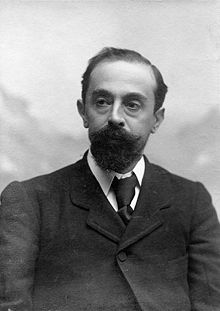This article has multiple issues. Please help improve it or discuss these issues on the talk page. (Learn how and when to remove these messages)
|
| Joan Maragall i Gorina | |
|---|---|
 Joan Maragall, by Pau Audouard dated 1903. Joan Maragall, by Pau Audouard dated 1903. | |
| Born | (1860-10-10)10 October 1860 Barcelona, Catalonia, Spain |
| Died | 20 December 1911(1911-12-20) (aged 51) Barcelona, Catalonia, Spain |
| Occupation | Poet, translator, journalist |
| Literary movement | Modernisme |

Joan Maragall i Gorina (Catalan pronunciation: [ʒuˈam məɾəˈɣaʎ]; 10 October 1860 in Barcelona – 20 December 1911) was a Catalan poet, journalist and translator, the foremost member of the modernisme movement in literature. His manuscripts are preserved in the Joan Maragall Archive of Barcelona.
Life
Maragall's upper-class family was dedicated to the flourishing textile industry in Barcelona, and after finishing school, Joan Maragall took on his father's job. Having never liked his family's trade, he decided to go to university instead, where he studied law to his father's great disappointment.
However, he dropped out of school and married Clara Noble with whom he had 13 children. In 1904 he won all three prizes awarded by the Jocs Florals in Barcelona, and was proclaimed Mestre en Gai Saber. His private home in Sant Gervasi was bought by the Biblioteca de Catalunya and can be visited. He died in 1911 and was buried at the Sant Gervasi Cemetery Barcelona.
His grandson, Pasqual Maragall, would become mayor of Barcelona and then President of Catalonia.
Work
Maragall's poetry was based on themes drawn from human life and nature. Highly influenced by German-language authors such as Nietzsche, Novalis and Goethe, all of whom he translated into Catalan, his poetry went through periods of decadentism and vitalism. He is best known for his 'theory of the living word', or teoria de la paraula viva, which advocated Nietzschean vitalism and spontaneous or even imperfect writing over colder and over-thought poetry.
In addition to his poetry writing, Maragall published journalism in avant-garde magazines of the time—including L'Avenç, Catalònia and Luz—where he became the leading proponent of Catalan modernisme.
Maragall supported Iberian Federalism.
A generous sampling of Maragall's most important poetry and prose is included in the extensively annotated One Day of Life is Life: Joan Maragall.
Poetic works
- Poesies (1895)
- Visions i Cants (1900)
- Les Disperses (1904)
- Enllà (1906), Fastenrath Award 1910.
- Seqüències (1911)
- includes the poem La fageda d'en Jordà
Digitized works
Digitization is available through the portal El món de Joan Maragall: Col·lecció visual de la vida i l'obra de l'autor or directly at Memòria Digital de Catalunya
See also
References
- Newcomb, Robert Patrick (2018). Iberianism and Crisis: Spain and Portugal at the Turn of the Twentieth Century. University of Toronto Press. p. 23. ISBN 9781487502966.
- Maragall, Joan (2020). One Day of Life is Life: Joan Maragall (translation by Ronald Puppo ed.). London - Barcelona: Fum d'Estampa Press. ISBN 9781916293953.
External links
- Maragall Archive at National Library of Catalonia
- Digitized works of Joan Maragall at National Library of Catalonia
- Year Joan Maragall 2010-2011
- "Joan Maragall". lletrA-UOC – Open University of Catalonia.
- Biography and works of Maragall (Spanish)
- Vídeo Joan Maragall Archived 2015-09-23 at the Wayback Machine (Catalan)
- Joan Maragall vist per Jordi Maragall i Noble (Spanish)
- Works by or about Joan Maragall at the Internet Archive
- Works by Joan Maragall at LibriVox (public domain audiobooks)
